自动化课程英文描述
- 格式:doc
- 大小:54.50 KB
- 文档页数:2
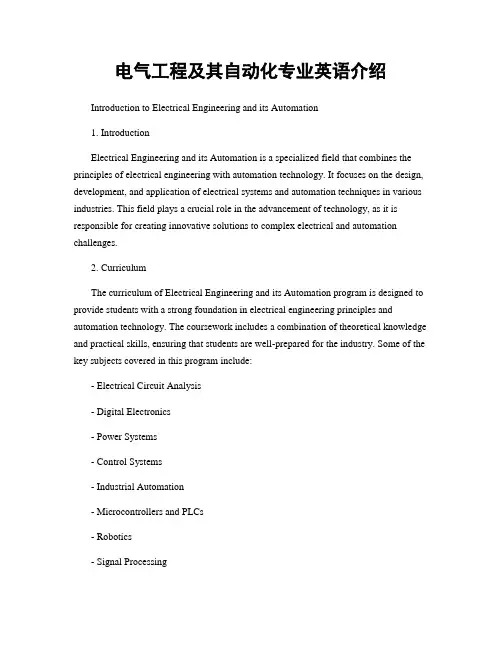
电气工程及其自动化专业英语介绍Introduction to Electrical Engineering and its Automation1. IntroductionElectrical Engineering and its Automation is a specialized field that combines the principles of electrical engineering with automation technology. It focuses on the design, development, and application of electrical systems and automation techniques in various industries. This field plays a crucial role in the advancement of technology, as it is responsible for creating innovative solutions to complex electrical and automation challenges.2. CurriculumThe curriculum of Electrical Engineering and its Automation program is designed to provide students with a strong foundation in electrical engineering principles and automation technology. The coursework includes a combination of theoretical knowledge and practical skills, ensuring that students are well-prepared for the industry. Some of the key subjects covered in this program include:- Electrical Circuit Analysis- Digital Electronics- Power Systems- Control Systems- Industrial Automation- Microcontrollers and PLCs- Robotics- Signal Processing- Communication Systems- Renewable Energy Systems3. Skills and CompetenciesUpon completion of the Electrical Engineering and its Automation program, students acquire a range of skills and competencies that are highly sought after in the industry. Some of the key skills include:- Proficiency in electrical circuit analysis and design- Knowledge of automation systems and control techniques- Ability to program microcontrollers and PLCs- Understanding of power systems and renewable energy technologies- Familiarity with signal processing and communication systems- Problem-solving and analytical skills- Project management and teamwork abilities4. Career OpportunitiesGraduates of Electrical Engineering and its Automation program have a wide range of career opportunities in various industries. Some of the popular career paths include:- Electrical Engineer: Designing, developing, and testing electrical systems for buildings, power plants, or manufacturing facilities.- Automation Engineer: Developing and implementing automation solutions for industrial processes, including robotics and control systems.- Power Systems Engineer: Working on the design and maintenance of electrical power systems, including distribution and transmission networks.- Control Systems Engineer: Designing and implementing control systems for industrial processes, ensuring efficient and safe operations.- Renewable Energy Engineer: Developing and managing renewable energy projects, such as solar or wind power systems.5. Research and InnovationElectrical Engineering and its Automation field is continuously evolving, with new technologies and advancements being introduced regularly. Research and innovation play a crucial role in this field, as they drive progress and improve existing systems. Students in this program have the opportunity to engage in research projects, collaborate with industry experts, and contribute to the development of new technologies.6. ConclusionIn conclusion, Electrical Engineering and its Automation is a dynamic and exciting field that combines electrical engineering principles with automation technology. The program provides students with a strong foundation in theory and practical skills, preparing them for a successful career in various industries. With the increasing demand for automation and renewable energy solutions, graduates of this program have excellent job prospects and opportunities for growth and innovation.。
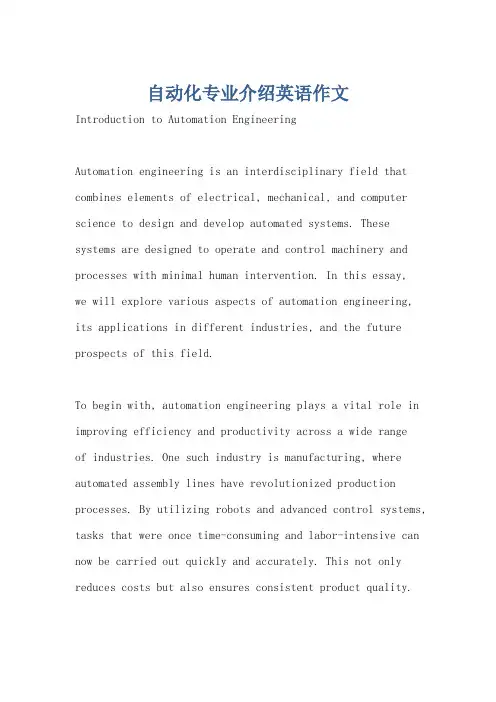
自动化专业介绍英语作文Introduction to Automation EngineeringAutomation engineering is an interdisciplinary field that combines elements of electrical, mechanical, and computer science to design and develop automated systems. These systems are designed to operate and control machinery and processes with minimal human intervention. In this essay,we will explore various aspects of automation engineering, its applications in different industries, and the future prospects of this field.To begin with, automation engineering plays a vital role in improving efficiency and productivity across a wide rangeof industries. One such industry is manufacturing, where automated assembly lines have revolutionized production processes. By utilizing robots and advanced control systems, tasks that were once time-consuming and labor-intensive can now be carried out quickly and accurately. This not only reduces costs but also ensures consistent product quality.Moreover, automation engineering has found applications in transportation systems as well. Automated vehicles have become a hot topic in recent years due to their potential to improve road safety and reduce traffic congestion. Through the use of sensors, cameras, artificial intelligence algorithms, and other advanced technologies, autonomous cars can navigate roads without direct human input. This technology may reshape the future of transportation by making it more efficient, sustainable, and safe.Furthermore, automation engineering has made significant strides in the field of healthcare. Medical devices equipped with automation technology have enhanced patient care by increasing accuracy in diagnosis and treatment processes. For instance, robotic surgical systems allow surgeons to perform complex procedures with greater precision and minimal invasiveness. Additionally, automation systems for medication delivery help ensure proper dosage administration while reducing human errors.Apart from these specific industries mentioned above,automation engineering also finds applications in agriculture, energy production, logistics management, and many others. The versatility of this field enables professionals to contribute across various sectors for optimized performance.Looking ahead into the future prospects of automation engineering, there is no doubt that this field will continue to expand rapidly. As technological advances continue at an exponential rate, so too will the need for experts with skills in automation engineering. The ongoing development of artificial intelligence, machine learning, and Internet of Things (IoT) technologies will continue to drive innovation in this field.In conclusion, automation engineering is amultidisciplinary field that revolutionizes industries with its efficient systems and processes. From manufacturing to healthcare and transportation, the applications of automation are diverse and far-reaching. As technology advances, so does the need for experts in this field who can design and implement automated solutions to improveproductivity, safety, and quality across various industries. With its promising future prospects, automation engineering is certainly an exciting field to be a part of.。
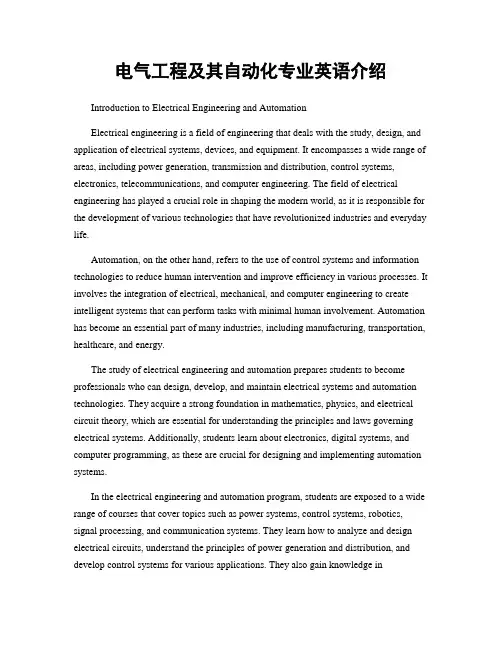
电气工程及其自动化专业英语介绍Introduction to Electrical Engineering and AutomationElectrical engineering is a field of engineering that deals with the study, design, and application of electrical systems, devices, and equipment. It encompasses a wide range of areas, including power generation, transmission and distribution, control systems, electronics, telecommunications, and computer engineering. The field of electrical engineering has played a crucial role in shaping the modern world, as it is responsible for the development of various technologies that have revolutionized industries and everyday life.Automation, on the other hand, refers to the use of control systems and information technologies to reduce human intervention and improve efficiency in various processes. It involves the integration of electrical, mechanical, and computer engineering to create intelligent systems that can perform tasks with minimal human involvement. Automation has become an essential part of many industries, including manufacturing, transportation, healthcare, and energy.The study of electrical engineering and automation prepares students to become professionals who can design, develop, and maintain electrical systems and automation technologies. They acquire a strong foundation in mathematics, physics, and electrical circuit theory, which are essential for understanding the principles and laws governing electrical systems. Additionally, students learn about electronics, digital systems, and computer programming, as these are crucial for designing and implementing automation systems.In the electrical engineering and automation program, students are exposed to a wide range of courses that cover topics such as power systems, control systems, robotics, signal processing, and communication systems. They learn how to analyze and design electrical circuits, understand the principles of power generation and distribution, and develop control systems for various applications. They also gain knowledge inprogramming languages, such as C++, MATLAB, and LabVIEW, which are commonly used in automation and control.Practical experience is a vital component of the electrical engineering and automation program. Students have the opportunity to work on real-world projects, either individually or in teams, to apply their theoretical knowledge and develop practical skills. They may work on projects such as designing electrical circuits, programming microcontrollers, developing automation systems, or troubleshooting electrical equipment. These hands-on experiences allow students to gain valuable insights into the industry and enhance their problem-solving abilities.Career prospects for graduates in electrical engineering and automation are promising. They can find employment in various industries, including power generation and distribution companies, manufacturing firms, telecommunications companies, and automation technology providers. They can work as electrical engineers, control systems engineers, automation engineers, or research and development engineers. With the increasing demand for automation in various sectors, there is a growing need for professionals who can design and implement intelligent systems.In conclusion, the field of electrical engineering and automation offers exciting opportunities for those interested in designing and developing electrical systems and automation technologies. The program provides a comprehensive education in various aspects of electrical engineering, including power systems, control systems, electronics, and automation. Graduates are equipped with the knowledge and skills necessary to pursue successful careers in a wide range of industries.。
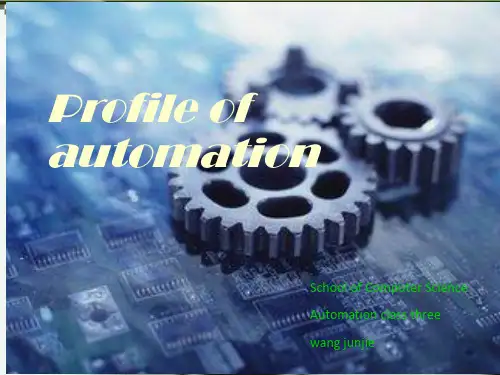
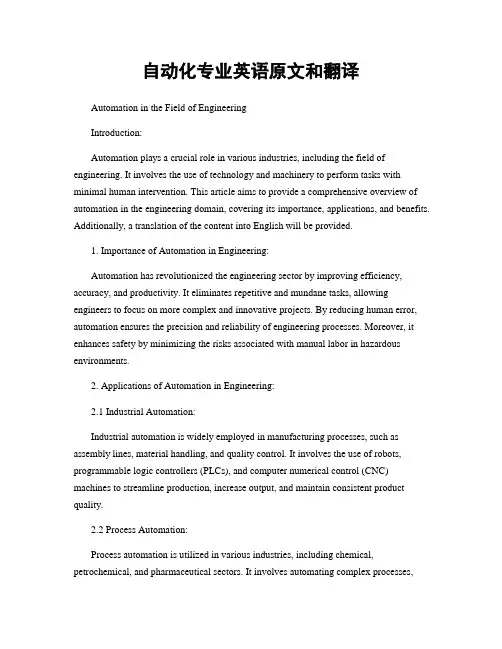
自动化专业英语原文和翻译Automation in the Field of EngineeringIntroduction:Automation plays a crucial role in various industries, including the field of engineering. It involves the use of technology and machinery to perform tasks with minimal human intervention. This article aims to provide a comprehensive overview of automation in the engineering domain, covering its importance, applications, and benefits. Additionally, a translation of the content into English will be provided.1. Importance of Automation in Engineering:Automation has revolutionized the engineering sector by improving efficiency, accuracy, and productivity. It eliminates repetitive and mundane tasks, allowing engineers to focus on more complex and innovative projects. By reducing human error, automation ensures the precision and reliability of engineering processes. Moreover, it enhances safety by minimizing the risks associated with manual labor in hazardous environments.2. Applications of Automation in Engineering:2.1 Industrial Automation:Industrial automation is widely employed in manufacturing processes, such as assembly lines, material handling, and quality control. It involves the use of robots, programmable logic controllers (PLCs), and computer numerical control (CNC) machines to streamline production, increase output, and maintain consistent product quality.2.2 Process Automation:Process automation is utilized in various industries, including chemical, petrochemical, and pharmaceutical sectors. It involves automating complex processes,such as batch production, mixing, and monitoring, to ensure accuracy, reduce waste, and enhance safety. Process control systems, sensors, and advanced algorithms are integral components of process automation.2.3 Building Automation:Building automation focuses on optimizing energy consumption, comfort, and security in residential, commercial, and industrial buildings. It includes automated lighting, HVAC (heating, ventilation, and air conditioning) systems, access control, and surveillance systems. Building automation improves energy efficiency, reduces operational costs, and provides a comfortable and secure environment.2.4 Robotics and Artificial Intelligence (AI):Robots and AI have revolutionized the engineering field. Robots are extensively used in manufacturing, construction, and exploration tasks, performing operations that are dangerous or impossible for humans. AI-powered systems enable machines to learn, adapt, and make decisions, enhancing automation capabilities in various engineering applications.3. Benefits of Automation in Engineering:3.1 Increased Efficiency and Productivity:Automation reduces human effort, enabling engineers to complete tasks faster and more efficiently. It eliminates manual errors, enhances accuracy, and ensures consistent output. This leads to increased productivity and allows engineers to focus on higher-value activities.3.2 Cost Reduction:Automation reduces labor costs by replacing manual tasks with machines. It also minimizes material waste and optimizes resource utilization, resulting in overall cost savings. Additionally, automation reduces the risk of accidents and associated expenses, such as worker compensation.3.3 Improved Quality and Reliability:Automation systems provide precise control over engineering processes, resulting in improved product quality and reliability. By eliminating human error, automation ensures consistency and adherence to specifications. This leads to enhanced customer satisfaction and brand reputation.3.4 Enhanced Safety:Automation eliminates the need for humans to perform dangerous tasks, reducing the risk of injuries and accidents. It also enables remote monitoring and control of critical processes, ensuring the safety of workers in hazardous environments. Overall, automation improves workplace safety and minimizes occupational hazards.Translation:自动化在工程领域的应用简介:自动化在包括工程领域在内的各个行业中起着至关重要的作用。
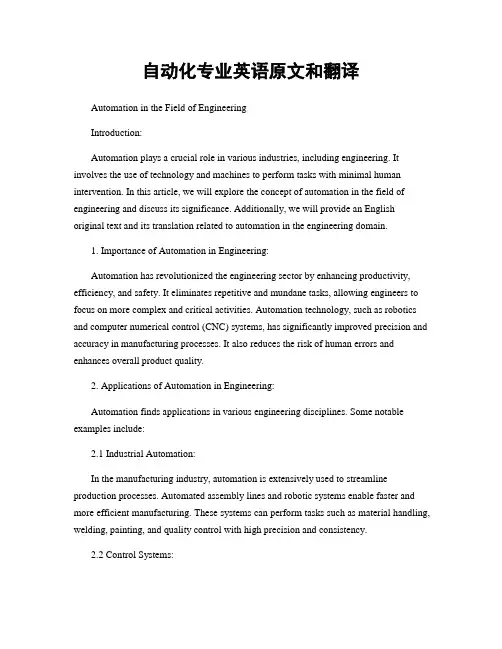
自动化专业英语原文和翻译Automation in the Field of EngineeringIntroduction:Automation plays a crucial role in various industries, including engineering. It involves the use of technology and machines to perform tasks with minimal human intervention. In this article, we will explore the concept of automation in the field of engineering and discuss its significance. Additionally, we will provide an English original text and its translation related to automation in the engineering domain.1. Importance of Automation in Engineering:Automation has revolutionized the engineering sector by enhancing productivity, efficiency, and safety. It eliminates repetitive and mundane tasks, allowing engineers to focus on more complex and critical activities. Automation technology, such as robotics and computer numerical control (CNC) systems, has significantly improved precision and accuracy in manufacturing processes. It also reduces the risk of human errors and enhances overall product quality.2. Applications of Automation in Engineering:Automation finds applications in various engineering disciplines. Some notable examples include:2.1 Industrial Automation:In the manufacturing industry, automation is extensively used to streamline production processes. Automated assembly lines and robotic systems enable faster and more efficient manufacturing. These systems can perform tasks such as material handling, welding, painting, and quality control with high precision and consistency.2.2 Control Systems:Automation is essential in control systems, allowing for the efficient regulation and control of various engineering processes. Programmable Logic Controllers (PLCs) are commonly used to automate industrial processes, ensuring optimal performance and safety. These systems monitor and control parameters such as temperature, pressure, flow rate, and level, thereby maintaining process stability.2.3 Building Automation:In the field of civil engineering, building automation systems are employed to manage and control various building functions. These systems integrate lighting, HVAC (Heating, Ventilation, and Air Conditioning), security, and energy management. By automating these functions, buildings can achieve energy efficiency, occupant comfort, and improved security.2.4 Transportation Automation:Automation has also made significant advancements in the transportation sector. Automated systems, such as traffic control systems and intelligent transportation systems, optimize traffic flow, reduce congestion, and enhance safety. Additionally, automation in vehicles, such as self-driving cars and autonomous drones, holds the potential to revolutionize transportation in the future.3. Challenges and Considerations in Automation:While automation offers numerous benefits, there are challenges that need to be addressed:3.1 Workforce Adaptation:With the increasing adoption of automation, there is a need for the workforce to adapt to new roles and acquire new skills. As certain tasks become automated, engineers must focus on managing and maintaining automated systems, as well as developing new technologies.3.2 Safety and Security:Automation systems must adhere to strict safety standards to prevent accidents and ensure the well-being of workers. Additionally, cybersecurity measures should be implemented to protect automated systems from potential threats and unauthorized access.3.3 Cost and Implementation:The initial cost of implementing automation systems can be significant. However, the long-term benefits, such as increased productivity and reduced operational costs, often outweigh the initial investment. Careful planning and analysis are necessary to ensure a successful and cost-effective implementation.4. English Original Text and Translation:English Original Text:"Automation has revolutionized the engineering industry, enabling faster and more efficient processes. By utilizing advanced technologies and machines, engineers can now focus on complex tasks that require critical thinking and problem-solving skills. Automation not only improves productivity but also enhances product quality and reduces human errors. With the continuous advancements in automation, the engineering field is poised for further growth and innovation."Translation (Chinese):“自动化已经彻底改变了工程行业,实现了更快速、更高效的工艺流程。
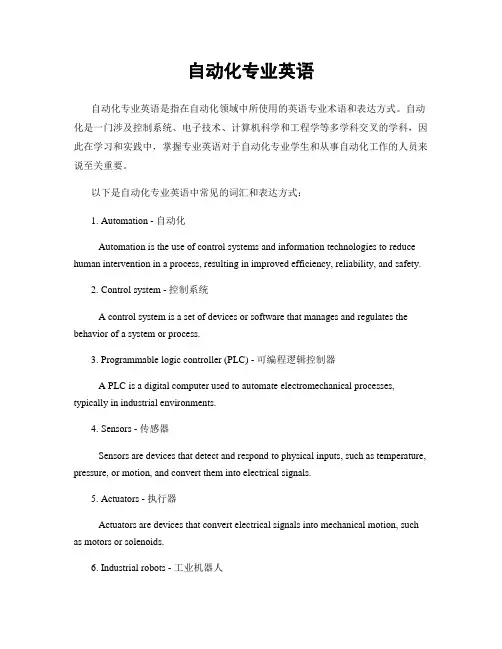
自动化专业英语自动化专业英语是指在自动化领域中所使用的英语专业术语和表达方式。
自动化是一门涉及控制系统、电子技术、计算机科学和工程学等多学科交叉的学科,因此在学习和实践中,掌握专业英语对于自动化专业学生和从事自动化工作的人员来说至关重要。
以下是自动化专业英语中常见的词汇和表达方式:1. Automation - 自动化Automation is the use of control systems and information technologies to reduce human intervention in a process, resulting in improved efficiency, reliability, and safety.2. Control system - 控制系统A control system is a set of devices or software that manages and regulates the behavior of a system or process.3. Programmable logic controller (PLC) - 可编程逻辑控制器A PLC is a digital computer used to automate electromechanical processes, typically in industrial environments.4. Sensors - 传感器Sensors are devices that detect and respond to physical inputs, such as temperature, pressure, or motion, and convert them into electrical signals.5. Actuators - 执行器Actuators are devices that convert electrical signals into mechanical motion, such as motors or solenoids.6. Industrial robots - 工业机器人Industrial robots are programmable machines designed to perform tasks with precision and speed in industrial settings.7. Human-machine interface (HMI) - 人机界面HMI refers to the graphical user interface through which humans interact with machines or systems, often using touchscreens or control panels.8. Supervisory control and data acquisition (SCADA) - 监控与数据采集系统SCADA is a system used to monitor and control industrial processes, allowing operators to remotely monitor and control various devices and collect data.9. Programmable automation controller (PAC) - 可编程自动化控制器A PAC is a device that combines the features of a PLC and a PC, providing advanced control capabilities and connectivity options.10. Process control - 过程控制Process control involves monitoring and adjusting variables in a production process to maintain desired output quality and efficiency.11. Feedback loop - 反馈环路A feedback loop is a control mechanism that uses the output of a system to adjust the input, ensuring the system operates within desired parameters.12. Industrial communication protocols - 工业通信协议Industrial communication protocols are standardized sets of rules and formats that enable devices and systems to exchange information in an industrial environment.13. Fault diagnosis - 故障诊断Fault diagnosis involves identifying and analyzing problems or malfunctions in a system to determine the cause and develop appropriate solutions.14. System integration - 系统集成System integration refers to the process of combining different subsystems or components into a unified system that functions effectively and efficiently.15. Real-time control - 实时控制Real-time control refers to the ability to monitor and respond to events or inputs immediately, without delay, to ensure timely and accurate control of a system.以上是自动化专业英语中的一些常见词汇和表达方式,掌握这些专业术语将有助于您在学习和实践中更好地理解和交流自动化相关的知识和技术。
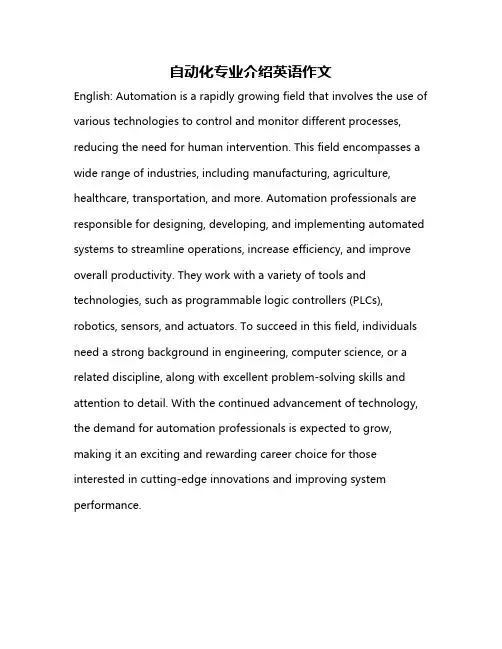
自动化专业介绍英语作文English: Automation is a rapidly growing field that involves the use of various technologies to control and monitor different processes, reducing the need for human intervention. This field encompasses a wide range of industries, including manufacturing, agriculture, healthcare, transportation, and more. Automation professionals are responsible for designing, developing, and implementing automated systems to streamline operations, increase efficiency, and improve overall productivity. They work with a variety of tools and technologies, such as programmable logic controllers (PLCs), robotics, sensors, and actuators. To succeed in this field, individuals need a strong background in engineering, computer science, or a related discipline, along with excellent problem-solving skills and attention to detail. With the continued advancement of technology, the demand for automation professionals is expected to grow, making it an exciting and rewarding career choice for those interested in cutting-edge innovations and improving system performance.中文翻译: 自动化是一个快速发展的领域,涉及使用各种技术来控制和监控不同的流程,减少人为干预的需求。
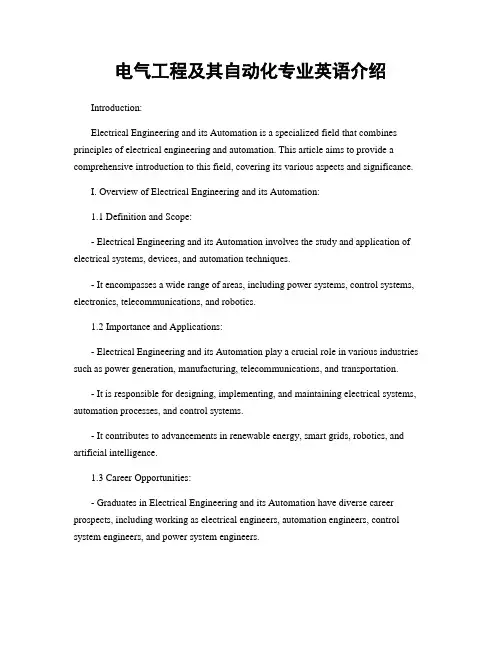
电气工程及其自动化专业英语介绍Introduction:Electrical Engineering and its Automation is a specialized field that combines principles of electrical engineering and automation. This article aims to provide a comprehensive introduction to this field, covering its various aspects and significance.I. Overview of Electrical Engineering and its Automation:1.1 Definition and Scope:- Electrical Engineering and its Automation involves the study and application of electrical systems, devices, and automation techniques.- It encompasses a wide range of areas, including power systems, control systems, electronics, telecommunications, and robotics.1.2 Importance and Applications:- Electrical Engineering and its Automation play a crucial role in various industries such as power generation, manufacturing, telecommunications, and transportation.- It is responsible for designing, implementing, and maintaining electrical systems, automation processes, and control systems.- It contributes to advancements in renewable energy, smart grids, robotics, and artificial intelligence.1.3 Career Opportunities:- Graduates in Electrical Engineering and its Automation have diverse career prospects, including working as electrical engineers, automation engineers, control system engineers, and power system engineers.- They can find employment in industries such as power generation companies, manufacturing firms, telecommunications companies, and research and development organizations.II. Key Areas of Study:2.1 Power Systems:- Power systems focus on the generation, transmission, and distribution of electrical energy.- Students learn about power generation technologies, power system analysis, power electronics, and renewable energy sources.- They also study power system protection, control, and optimization techniques.2.2 Control Systems:- Control systems involve the design and analysis of systems that regulate and control processes.- Students learn about feedback control, system modeling, stability analysis, and optimization techniques.- They also study industrial automation, robotics, and mechatronics, which involve the integration of electrical, mechanical, and computer engineering.2.3 Electronics and Telecommunications:- This area focuses on the design and development of electronic circuits, devices, and communication systems.- Students learn about analog and digital electronics, integrated circuits, signal processing, and communication networks.- They also study wireless communication, satellite systems, and optical communication.III. Skills and Competencies:3.1 Technical Skills:- Graduates in Electrical Engineering and its Automation possess strong technical skills in electrical circuit analysis, power system design, control system design, and electronics.- They are proficient in using software tools such as MATLAB, Simulink, and CAD (Computer-Aided Design) software.- They have a solid understanding of programming languages such as C, C++, and Python.3.2 Problem-Solving Abilities:- Electrical engineers are trained to analyze complex problems and develop innovative solutions.- They have the ability to troubleshoot electrical and automation systems and identify and rectify faults.- They can apply mathematical and analytical skills to optimize system performance.3.3 Communication and Teamwork:- Effective communication and teamwork are essential skills in the field of Electrical Engineering and its Automation.- Engineers need to collaborate with colleagues, clients, and stakeholders to design and implement projects successfully.- They should be able to present their ideas and findings clearly and concisely.IV. Research and Innovation:4.1 Research Opportunities:- Electrical Engineering and its Automation offer numerous research opportunities in areas such as renewable energy, smart grids, and automation.- Researchers can contribute to the development of sustainable energy systems, intelligent control algorithms, and advanced automation technologies.4.2 Innovation and Development:- The field of Electrical Engineering and its Automation is driven by innovation and technological advancements.- Engineers are constantly developing new technologies, devices, and systems to improve efficiency, reliability, and sustainability.- Innovation in this field has led to the emergence of smart homes, electric vehicles, and advanced robotics.4.3 Collaboration and Partnerships:- Collaboration between academia, industry, and research institutions is crucial for promoting innovation in Electrical Engineering and its Automation.- Collaborative projects and partnerships facilitate the exchange of knowledge, resources, and expertise, leading to groundbreaking advancements.V. Future Trends and Challenges:5.1 Emerging Technologies:- Electrical Engineering and its Automation are witnessing rapid advancements in technologies such as artificial intelligence, Internet of Things (IoT), and renewable energy systems.- These technologies offer new possibilities for automation, energy efficiency, and intelligent control.5.2 Sustainability and Energy Efficiency:- With the increasing focus on sustainability, Electrical Engineering and its Automation are playing a vital role in developing energy-efficient systems and renewable energy sources.- Engineers are working towards creating smart grids, energy storage systems, and optimizing power consumption.5.3 Cybersecurity and Data Privacy:- As automation and digitalization increase, the field faces challenges related to cybersecurity and data privacy.- Electrical engineers need to develop secure systems and protocols to protect critical infrastructure and ensure data privacy.Conclusion:Electrical Engineering and its Automation is a dynamic and interdisciplinary field that offers diverse career opportunities and contributes to technological advancements. It encompasses areas such as power systems, control systems, electronics, and telecommunications. With the rapid pace of innovation and emerging technologies, this field is poised for significant growth and will continue to shape the future of various industries.。

自动化专业英语介绍开场白Good morning.it is really a great honor to have this opportunity for this interview, i would like to answer whatever you may raise, and i hope i can make a good performance today. now i will introduce myself briefly, My name is liuya and I born in Shandong province which capital is Jinan and it is a very beautiful city. There are many places of historic interest and scenic beauty, for example ,Confucian temple ,Tai mountain and so on.I am currently a senior student at Dezhou university, my major is Automation,and I will receive my bachelor degree after my graduation in june . In the past 4 years,I spend most of my time on study, and I have acquired basic knowledge of my major both in theory and in practice, the four years' university education gives me a lot of things to learn,a lot of chances to try,and a lot of practices to improve myself. It teaches me not only what to study and how to think,but also to see the importance of practical ability (such as doing experiment as much as possible).I am open-minded, optimistic and confident.quick in thought and very fond of MCU, willing and have broad interests like basketball, reading and especially in engineering such as softwar e programming, I also do many things as pastime job,for example I am as a tutor in sophom ore. The middle school student enter senior school with my help at last, meanwhile I feel ver y happy, though it was very hard ,I think I have learned what I can not acquire in my study. In the university life. I have made many good friends. it is worth doing them I like to chat with my friends, almost talk everything ,my favorite pastime is playingbasketball with them, They help me improve my study and research ability, do everything just like a man,and often give me good example to follow.\Four years' college education give me a lot of things to learn,a lot of chances to try,and do a lot of practices to improve myself. It teaches me not only what to study and how to think, but also to see the importance of practical ability. Although I have broad interests in many aspects and grasp the essential knowledge of the major, but I think at present, I can do many things in a superficial level, but not be competent to do things professionally owing to lack of ample knowledge and ability. So I think further study is still urgent for me to realize self-value.The major that I hope pursue for my further education is Automatic Control systems design. Because I find Automatic Control systems is playing a more and more import ant role in our modern society. And nowadays in China, with the recognition by the govern ment, our industry is growing rapidly and that may provide a lot of chances to us.I plan to concentrate on study and research in this field in my graduate time. And I hope I can form a systematic view of Automatic Control systems design technology and make a solid foundation for future profession after two years and a half study here.I have the notion ,as to life, that the satisfaction we get from lifetime depends on how high we choose our difficulties. I'm doing my best!OK, that’s all. Thank you very much。
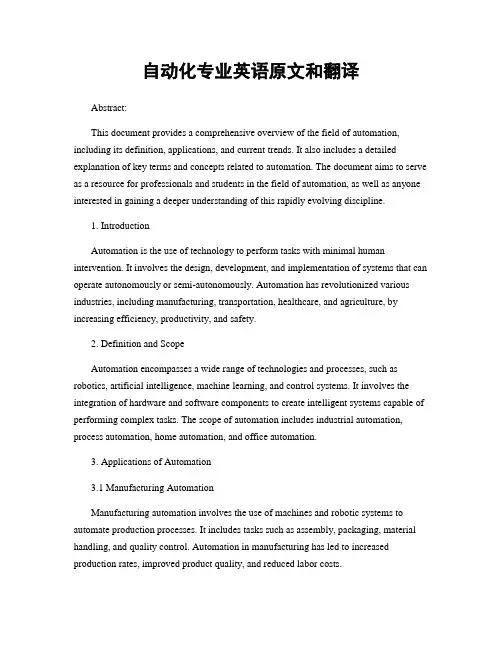
自动化专业英语原文和翻译Abstract:This document provides a comprehensive overview of the field of automation, including its definition, applications, and current trends. It also includes a detailed explanation of key terms and concepts related to automation. The document aims to serve as a resource for professionals and students in the field of automation, as well as anyone interested in gaining a deeper understanding of this rapidly evolving discipline.1. IntroductionAutomation is the use of technology to perform tasks with minimal human intervention. It involves the design, development, and implementation of systems that can operate autonomously or semi-autonomously. Automation has revolutionized various industries, including manufacturing, transportation, healthcare, and agriculture, by increasing efficiency, productivity, and safety.2. Definition and ScopeAutomation encompasses a wide range of technologies and processes, such as robotics, artificial intelligence, machine learning, and control systems. It involves the integration of hardware and software components to create intelligent systems capable of performing complex tasks. The scope of automation includes industrial automation, process automation, home automation, and office automation.3. Applications of Automation3.1 Manufacturing AutomationManufacturing automation involves the use of machines and robotic systems to automate production processes. It includes tasks such as assembly, packaging, material handling, and quality control. Automation in manufacturing has led to increased production rates, improved product quality, and reduced labor costs.3.2 Transportation AutomationTransportation automation aims to automate various aspects of transportation systems, including vehicles, traffic control, and logistics. It includes technologies such as autonomous vehicles, intelligent transportation systems, and automated warehouses. Automation in transportation can enhance safety, reduce congestion, and optimize resource utilization.3.3 Healthcare AutomationHealthcare automation involves the use of technology to streamline healthcare processes and improve patient care. It includes electronic medical records, telemedicine, robotic surgery, and automated drug dispensing systems. Automation in healthcare can enhance accuracy, reduce errors, and improve overall efficiency.3.4 Agriculture AutomationAgriculture automation focuses on automating agricultural processes to increase productivity and reduce labor requirements. It includes technologies such as precision farming, automated irrigation systems, and robotic harvesting. Automation in agriculture can optimize resource usage, improve crop yields, and minimize environmental impact.4. Key Terms and Concepts4.1 RoboticsRobotics is the branch of automation that deals with the design, construction, and operation of robots. Robots are programmable machines capable of carrying out tasks autonomously or under human supervision. They can be used in various industries for tasks that are dangerous, repetitive, or require high precision.4.2 Artificial Intelligence (AI)Artificial Intelligence refers to the ability of machines to mimic human intelligence and perform tasks that typically require human intelligence, such as speech recognition,decision-making, and problem-solving. AI is a key component of many automation systems, enabling machines to learn from data and adapt to changing conditions.4.3 Machine LearningMachine Learning is a subset of AI that focuses on the development of algorithms and models that allow machines to learn from data and make predictions or decisions without explicit programming. Machine learning algorithms are used in various automation applications, such as image recognition, natural language processing, and predictive maintenance.4.4 Control SystemsControl systems are used to monitor and regulate the behavior of machines and processes. They involve sensors, actuators, and feedback mechanisms to maintain desired performance and stability. Control systems are essential in automation to ensure accurate and reliable operation of automated systems.5. Current Trends in Automation5.1 Internet of Things (IoT)The Internet of Things refers to the network of interconnected devices that can communicate and exchange data. IoT enables automation by connecting physical objects to the internet, allowing remote monitoring and control. It has applications in various domains, such as smart homes, industrial automation, and healthcare.5.2 Big Data AnalyticsBig Data Analytics involves the use of advanced analytics techniques to extract insights from large and complex datasets. In automation, big data analytics can be used to optimize processes, detect anomalies, and make data-driven decisions. It enables predictive maintenance, real-time monitoring, and continuous improvement.5.3 Collaborative RobotsCollaborative robots, also known as cobots, are designed to work alongside humans in a shared workspace. They are equipped with sensors and safety features to ensure safe interaction with humans. Collaborative robots are increasingly used in manufacturing, healthcare, and other industries to enhance productivity and flexibility.Conclusion:Automation is a rapidly evolving field with significant implications for various industries and society as a whole. This document has provided an in-depth overview of automation, including its definition, applications, key terms, and current trends. It serves as a valuable resource for professionals and students in the field of automation, as well as anyone interested in understanding the fundamental concepts and advancements in this exciting discipline.。
自动化专业英语自动化专业英语是指在自动化领域中使用的专门术语和表达方式。
在这篇文本中,我将为您介绍自动化专业英语的基本概念、常用词汇和短语,以及一些与自动化相关的实际应用案例。
一、基本概念1. Automation(自动化):The technique of making an apparatus, a process, or a system operate automatically.自动化是一种使设备、过程或者系统自动运行的技术。
2. Control system(控制系统):A system that manages, commands, directs, or regulates the behavior of other devices or systems.控制系统是管理、指挥、指导或者调节其他设备或者系统行为的系统。
3. Programmable logic controller (PLC)(可编程逻辑控制器):A digital computer used for automation of electromechanical processes.可编程逻辑控制器是用于自动化机电机械过程的数字计算机。
4. Human-machine interface (HMI)(人机界面):The point of interaction between a human operator and a machine, often used to control and monitor automated systems.人机界面是人类操作员与机器之间的交互点,通常用于控制和监控自动化系统。
二、常用词汇和短语1. Sensor(传感器):A device that detects and responds to physical inputs fromthe environment.传感器是一种能够检测和响应环境中物理输入的设备。
介绍自动化的英语作文Automation is the process of using technology to control and monitor tasks that were once performed by humans. This can include anything from industrial processes to household chores. Automation has become an essential part of many industries, including manufacturing, agriculture, and transportation.One of the key benefits of automation is increased efficiency. By automating tasks, companies can reduce the amount of time and resources required to complete them. This can lead to cost savings and increased productivity. Automation can also improve the quality and consistency of products and services. Machines are not subject to human error and can perform tasks with a high level of precision.Another benefit of automation is improved safety. By using machines to perform dangerous or repetitive tasks,companies can reduce the risk of injury to their employees. For example, automation is commonly used in manufacturing to handle hazardous materials or heavy machinery.Automation can also lead to increased competitiveness. Companies that invest in automation technologies can improve their speed and flexibility, allowing them to respond more quickly to changes in the market. This can give them a competitive edge over their rivals.Despite these benefits, there are also challenges associated with automation. One of the main concerns is the potential impact on jobs. Automation can lead to job displacement as machines take over tasks that were once performed by humans. However, it can also create new job opportunities in industries that support automation technologies.Another challenge is the initial cost of implementing automation. Companies must invest in technology and trainingto successfully automate their processes. This can be a significant financial burden, especially for small businesses.In conclusion, automation is a powerful tool that canbring many benefits to companies. However, it is importantfor businesses to carefully consider the costs and challenges associated with automation before implementing it. By doing so, they can maximize the advantages of automation while minimizing potential drawbacks.。
电气工程及其自动化专业英语介绍Introduction:Electrical Engineering and Automation is a field that combines the principles of electrical engineering with the latest advancements in automation technology. This interdisciplinary field plays a crucial role in designing, developing, and maintaining electrical systems and automation processes. In this article, we will provide an overview of the key aspects of Electrical Engineering and Automation, highlighting its importance in various industries.1. Importance of Electrical Engineering:1.1 Electrical Systems: Electrical engineers design and develop systems that generate, transmit, and distribute electrical power. They also work on improving the efficiency and reliability of existing systems.1.2 Electronics: Electrical engineers are involved in designing and developing electronic devices such as computers, smartphones, and medical equipment. They also work on improving the performance and functionality of these devices.1.3 Renewable Energy: Electrical engineers play a key role in the development of renewable energy sources such as solar, wind, and hydroelectric power. They work on designing and implementing systems that harness these energy sources efficiently.2. Role of Automation Technology:2.1 Industrial Automation: Automation technology is used in various industries to improve efficiency, productivity, and safety. Electrical engineers work on designing and implementing automated systems for manufacturing processes.2.2 Robotics: Automation technology is also used in the field of robotics, where electrical engineers design and develop robotic systems for various applications such as manufacturing, healthcare, and space exploration.2.3 Control Systems: Electrical engineers work on designing and implementing control systems that regulate the operation of machines and processes. These systems ensure optimal performance and safety.3. Skills Required in Electrical Engineering and Automation:3.1 Technical Knowledge: Electrical engineers need a strong foundation in mathematics, physics, and electrical engineering principles. They also need to stay updated on the latest advancements in automation technology.3.2 Problem-Solving Skills: Electrical engineers must be able to analyze complex problems and come up with innovative solutions. They need to think critically and creatively to design and implement effective systems.3.3 Communication Skills: Electrical engineers often work in teams with professionals from other disciplines. They need to effectively communicate their ideas and collaborate with others to achieve project goals.4. Career Opportunities in Electrical Engineering and Automation:4.1 Electrical Engineer: Graduates in Electrical Engineering and Automation can work as electrical engineers in various industries such as power generation, telecommunications, and electronics manufacturing.4.2 Automation Engineer: Graduates can also work as automation engineers, designing and implementing automated systems in industries such as automotive, aerospace, and pharmaceuticals.4.3 Control Systems Engineer: Graduates can pursue a career as control systems engineers, working on designing and implementing control systems for various applications.5. Future Trends in Electrical Engineering and Automation:5.1 Internet of Things (IoT): The integration of IoT technology with electrical engineering and automation is expected to revolutionize various industries, enabling smart and connected systems.5.2 Artificial Intelligence (AI): AI technology is increasingly being used in automation systems to improve efficiency and decision-making processes. Electrical engineers will play a key role in implementing AI solutions.5.3 Sustainable Energy Solutions: With the growing focus on sustainability, electrical engineers will continue to work on developing innovative solutions for renewable energy generation and distribution.In conclusion, Electrical Engineering and Automation is a dynamic and interdisciplinary field that offers a wide range of career opportunities. Graduates in this field are well-equipped to contribute to the development of cutting-edge technologies and solutions for various industries.。
自动化专业英文版简介Automation Engineering is a branch of engineering that deals with the application of technology and control systems to automate processes and enhance productivity. It encompasses various fields such aselectrical engineering, mechanical engineering, computer science, and control systems engineering. This discipline focuses on designing, developing, and implementing automated systems that can perform tasks with minimal human intervention.Automation Engineering has gained significant importance in various industries due to its ability to improve efficiency, reliability, and safety. It involves the integration of hardware and software components to create intelligent systems that can monitor, control, and optimize processes. These systems can be found in manufacturing plants, power plants, transportation systems, and even in our homes.One of the key aspects of Automation Engineering is the use of sensors and actuators to gather data and perform physical actions. Sensors are used to detect changes in the environment or process variables, while actuators are used to initiate the desired response or action. These components are connected to a control system, which processes the data and provides instructions to achieve the desired outcome.The field of Automation Engineering also includes the development of algorithms and software programs that facilitate the automation process. These programs can range from simple control loops to complex algorithms that utilize artificial intelligence and machine learning techniques.They enable the automation system to make intelligent decisions, adapt to changing conditions, and optimize performance.Automation Engineering has numerous applications across various industries. In manufacturing, it is used to automate production lines, reducing labor costs and increasing productivity. In the energy sector, it is used to control and optimize power generation and distribution systems, improving efficiency and reducing energy consumption. In transportation, it is used to automate vehicles and optimize traffic flow, enhancing safety and reducing congestion. In our homes, it is used to control and monitor various devices and systems, making our lives more convenient and efficient.To pursue a career in Automation Engineering, one must have a strong foundation in mathematics, physics, and computer science. An understanding of control systems, electrical circuits, and programming languages is also essential. Additionally, problem-solving skills, creativity, and the ability to work in a team are highly valued in this field.The demand for Automation Engineers is expected to growsignificantly in the coming years as industries continue to embrace automation to improve efficiency and competitiveness. Automation Engineering graduates can find employment opportunities in various industries such as manufacturing, energy, transportation, and robotics. They can work as control system engineers, automation engineers, process engineers, or even as researchers and developers of new automation technologies.In conclusion, Automation Engineering is an exciting and rapidly growing field that offers numerous opportunities for those interested in technology and innovation. It involves the design, development, and implementation of intelligent systems that can automate processes and enhance productivity. With the increasing adoption of automation across industries, the demand for skilled Automation Engineers is on the rise. So, if you have a passion for technology and problem-solving, Automation Engineering may be the perfect career path for you.。
自动化专业英语原文和翻译自动化专业英语原文和翻译是指将自动化专业相关的文本内容进行英文原文和翻译的处理。
自动化专业是现代工程技术领域的一个重要学科,涉及到自动控制、机械电子、计算机科学等多个方面的知识。
在国际交流和学术研究中,使用英语进行交流和发表论文是非常普遍的。
下面是一段关于自动化专业的英文原文和翻译示例:原文:Automation is the technology by which a process or procedure is performed with minimal human assistance. It plays a crucial role in various industries, including manufacturing, transportation, and healthcare. Automation systems are designed to increase efficiency, improve safety, and reduce human errors. With the rapid development of technology, automation has become an essential part of modern society.翻译:自动化是一种通过最小化人类干预来执行过程或者程序的技术。
它在包括创造业、交通运输和医疗保健等各个行业中起着至关重要的作用。
自动化系统旨在提高效率、改善安全性并减少人为错误。
随着技术的快速发展,自动化已成为现代社会不可或者缺的一部份。
原文:In the field of automation, there are various sub-disciplines, such as industrial automation, process automation, and home automation. Industrial automation focuses on the use of control systems to operate industrial machinery and processes. Process automation involves the use of technology to automate repetitive tasks and streamline workflows. Home automation aims to provide convenience and comfort by integrating various household devices and systems.翻译:在自动化领域中,有各种子学科,如工业自动化、过程自动化和家庭自动化。
自动化课程简介中英文自动化课程简介(中英文)中文简介:自动化课程是一门涵盖自动控制系统、传感器与执行器、工业机器人等内容的学科,旨在培养学生掌握自动化技术的基本理论和实践技能。
本课程将通过理论讲授、实验操作和项目实践等多种教学手段,帮助学生深入了解自动化技术的原理和应用,并培养学生的创新能力和问题解决能力。
课程内容包括自动控制系统的基本概念与原理、传感器与执行器的工作原理与应用、工业机器人的结构与控制、自动化生产线的设计与优化等。
学生将学习到自动控制系统的建模与仿真、传感器与执行器的选型与调试、工业机器人的编程与操作等实用技能。
本课程将通过课堂讲授,结合实验教学和实践项目,使学生能够在实际操作中掌握自动化技术的应用。
学生将参与到实验室的实际项目中,学习并运用自动化技术解决实际问题。
通过实践项目的完成,学生将培养自主学习和团队合作的能力,提高问题分析和解决问题的能力。
英文简介:Introduction to Automation CourseThe Automation Course is a discipline that covers topics such as automatic control systems, sensors and actuators, and industrial robots. Its aim is to cultivate students' understanding of the basic theories and practical skills of automation technology. This course will use various teaching methods, including theoretical lectures, laboratory experiments, and project practices, to help students gain in-depth knowledge of the principles and applications of automation technology, as well as develop their innovation and problem-solving abilities.The course content includes the basic concepts and principles of automatic control systems, the working principles and applications of sensors and actuators, the structure and control of industrial robots, and the design and optimization of automated production lines. Students will learn practical skills such as modeling and simulation of automatic control systems, selection and debugging of sensors and actuators, programming and operation of industrial robots.Through classroom teaching, combined with laboratory experiments and practical projects, this course enables students to apply automation technology in practical operations. Students will participate in actual projects in the laboratory, learning and applying automation technology to solve real-world problems. By completing practical projects, students will develop their abilities in self-directed learning and teamwork, as well as enhance their problem analysis and problem-solving skills.In conclusion, the Automation Course provides students with a comprehensive understanding of automation technology, equipping them with practical skills and knowledge to apply automation principles in various industries. This course not only enhances students' academic abilities but also prepares them for future careers in the field of automation.。
Description of the main subjects
Subject Hours Main topics
C Language Programming 40 Data types, Operators and Expressions of C
Language, Sequential Programming, Structured
Programming, Looping, Functions
Calculus 168 Limits, Functions, Derivatives, Integrals,
Infinite series
Introduction of Automation 16
Branches, History and Essence of Automation
Technology
Linear Algebra 40
System of Linear Equations, Method of
Substitution, Gaussian Elimination,
Gauss-Jordan Elimination, Matrix Methods,
Linear Independence, Matrix Algebra, Inverse
Determinants, Cramer’s Rule, Eigenvalues and
Eigenvectors
Physics 136 Classical mechanics, Electromagnetism,
Statistical mechanics, Thermodynamics,
Quantum mechanics, Relativity
Circuit Theory 80 Circuit Basics, Resistive Circuit Analysis, Energy
Storage Elements, AC Analysis, Laplace and
Fourier Transform, 3-Phase Power, Two Port
Networks
Analogue electronics 64 Operational Amplifiers, Diodes, Bipolar Junction
Transistors, Field Effect Transistors
Functions of Complex Variables and Integral Transformation 40 Complex Numbers , Complex Functions,
Residue Theory, Fourier Transform, Laplace
Transform, Z Transform
Probability Theory 40
The Counting Principle, Probability Spaces,
Mathematical Review, Combinatorics,
Conditional Probability, Random Variables
MATLAB 40 Basic usage of MATLAB
Power Electronic Circuits 48
Diodes, Schottky Diodes, Power Bipolar
Junction Transistors, MOSFETs, Silicon
Controlled Rectifier, Thyristors, Converter:
AC-to-DC, DC-to-AC, DC-to-DC, AC-to-AC
Principle and Towage of Electrical Machinery 88 Vectors and Fields, Magnetic Field Concepts,
AC Motors and Generators, DC Motors and
Generators
Digital Electronic Technology 56 Boolean Logic, Logic Gates, Trigger, VHDL, Logic
Circuit, Programmable Logic Controller
Microcomputer Technology 72 16bit and 32bit Microprocessors (Intel 8086),
RAM, ROM, Data Transmission, Serial and
Parallel Interfaces, Interrupt Controller, D/A and
A/D Conversion, Counter and Timer, Single Chip
Microcomputer (SCM)
Principles of Automatic Control 80 Mathematical Model of Automatic Control
System, Time-Domain Analysis, Root Locus,
Frequency-Domain Analysis, Revise of
Automatic Control System, Nonlinear
Automatic Control System
Power Supply of Industrial Enterprise 48 Calculation of Electrical Load, Short-Circuit
Current and its Calculation, Electrical
Substation and Power Supply Network,
Overload Protection
Computer Control System 64 Fourier Transform, Z Transform, Stability
Analysis of Computer Control System, Analog
Design Method of Digital Controller(PID
Controller, Smith Predictive Control ), Direct
Design Method of Digital Controller
Process Control System 48 Detection of Process Parameters, Control
Instrument, Mathematical model of controlled
process, Single-loop control system, Cascade
Control System, Feedforward and composite
control system, Time delay control system
Modern Control Theory 48
State-Space Equations, Solutions of State-Space
Equations, Controllability, Observability,
Lyapunov Stability Methods
DC Automatic Control System 64 Single-Loop DC Motor Control System,
Multi-Loop DC Motor Control System,
Reversible DC Motor control System
Robotics 32 Introduction of Robotics, Physical Construction,
Components
Assembly Language 48 x86 Basics, Data Transfer Instructions, Control
Flow Instructions, Arithmetic Instructions, Logic
Instructions, Shift and Rotate Instructions,
Usage of Microsoft Macro Assembler (MASM)